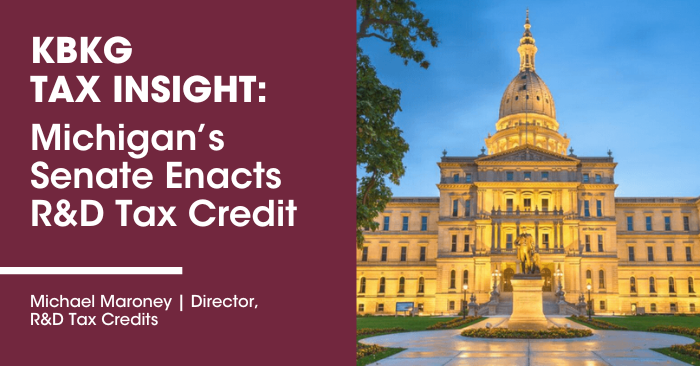KBKG Tax Insight: Michigan's Senate Enacts R&D Tax Credit
By Michael Maroney | Director, Research & Development Tax Credits
On March 19, 2024, Michigan’s Senate passed legislation enacting an R&D credit, the first of its kind since the R&D credit expired over a decade ago. The Senate passed HB 5100, which the Democrat-led Michigan House passed on October 31, 2023. Governor Whitmer has expressed her support for a state R&D credit and is expected to sign the legislation, which amends 1967 PA 281, entitled “Income Tax Act of 1967,” by adding section 677.
The provisions of the bill are as follows:
-
- For tax years beginning on or after January 1, 2024, a nonrefundable tax credit is available to Michigan taxpayers performing qualified research within Michigan.
- For taxpayers with 250 or more employees, the credit is equal to 10% of its qualified research expenditures (QRE), exceeding the base amount up to a $2,000,000 cap.
- For taxpayers with less than 250 employees, the credit is equal to 15% of its QRE, exceeding the base amount up to a $250,000 cap.
- An additional 5% of the QRE exceeding a base amount up to a $200,000 cap is available for taxpayers collaborating with a research university within the state.
- The base amount is the average annual QRE for the three years preceding the credit year.
- The annual cap for Michigan’s R&D credit program is $100 million, $25 million of which is set aside for small businesses.
- The credit is refundable if the state’s R&D credit program annual caps are not reached and only if a taxpayer’s nonrefundable credits have been fully utilized in the credit year.
The QRE eligible for this credit must relate to the activities meeting the requirements of IRC §41 (To be eligible for R&D Tax Credits, research activities must meet the criteria in the IRS Four-Part Test). The tax credits are available for expenditures including:
-
- Wages paid to an employee performing research activities conducted at a facility in Michigan.
- Wages paid to any employees directly supporting or directly supervising an employee performing research activities conducted at a facility in Michigan.
- Supplies used or consumed while performing research activities at a facility in Michigan.
- A portion of 3rd party research was conducted in Michigan.
KBKG Insight:
Michigan is one step closer to joining its neighbors in the Midwest in providing a significant boost to taxpayers, particularly small businesses and start-ups. The immediate cash savings from the credit allow taxpayers to invest in their businesses, hire employees, launch new products, and encourage capital expenditures to build out a lab or expand a production facility. These tax savings are in addition to any federal R&D credit for which Michigan taxpayers are already eligible.
What Opportunity Does the Michigan R&D Tax Credit Create?
The federal R&D credit already offers Michigan taxpayers roughly 10% of its QRE in the form of a tax credit. When the Governor signs this legislation, Michigan taxpayers could potentially receive a combined federal and state credit for roughly 20% of its total QRE. This would make Michigan a more attractive state in which to start a business. For those businesses already operating in the state, this credit could provide huge tax savings for activities they are already conducting.
Michael Maroney | Director – Research & Development Tax Credits
Michael Maroney is a Director with KBKG. He advises clients on tax matters related to federal and state Research and Development (R&D) Tax Credits. He has advised numerous Fortune 1000 clients across a variety of industries. He has successfully defended his client’s R&D claims before the IRS and state taxing authorities. Read More



